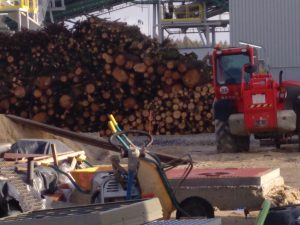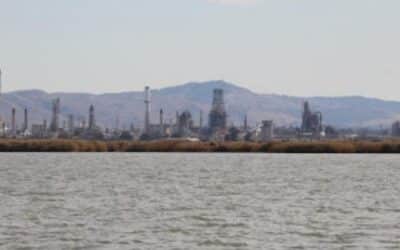European Investment Bank’s loan for Greenalia’s Curtis Biomass Plant: A Faiilure of Due Diligence? – Joint report by Salva la Selva and Biofuelwatch
Click here to download the full report with references.
Click here for the German version and click here for the report in Spanish.
Background and conclusions:
In June 2018, the European Investment Bank (EIB) approved a €60 million loan for the Spanish company Greenalia, S.A. to build a 50-Megawatt wood-burning electricity-only power station in Curtis-Texeiro, A Coruña, Galicia.
The power station, permitted to burn 546,000 tonnes of wood a year, was officially commissioned in March 2020.
The EIB’s decision to award a loan to Greenalia for this plant has been strongly criticised by Galician and EU campaign groups: in Galicia, the environmental association Petón do Lobo has petitioned the European Commission for an investigation into the EIB’s decision, and the NGO ClientEarth has sought an order to annul the EIB’s decision to refuse a review of the loan award in the European Court.
The EIB has justified granting a €60 million loan to Greenalia by claiming that the plant would be burning nothing other than logging residues from the nearby region, which would help to implement Galician legislation to prevent wildfires by reducing fuel load in tree plantations and forests. This ‘benefit’, they argued, outweighed the fact that the supposed efficiency of 35.6% pushed the scheme below the Bank’s own economic threshold.
Yet none of those claims are borne out by the facts: the net efficiency of the plant is well below the minimum efficiency standard in the Industrial Emissions Directive. Even the total electricity output of the plant is far lower than what the Bank believed it to be. Those figures are contained in documents the EIB published on its own website, but evidently failed to scrutinise. The EIB further misinterpreted the Galician law about residues removal, ignoring the fact that this law sets out to protect soils and waterways from excessive and environmentally destructive removal of logging residues. Perhaps most seriously, the Bank’s due diligence process failed to ensure that the plant would only burn residues, as three pieces of evidence of large-scale roundwood sourcing show.
The EIB has justified granting a €60 million loan to Greenalia by claiming that the plant would be burning nothing other than logging residues from the nearby region, which would help to implement Galician legislation to prevent wildfires by reducing fuel load in tree plantations and forests. This ‘benefit’, they argued, outweighed the fact that the supposed efficiency of 35.6% pushed the scheme below the Bank’s own economic threshold.
Yet none of those claims are borne out by the facts: the net efficiency of the plant is well below the minimum efficiency standard in the Industrial Emissions Directive. Even the total electricity output of the plant is far lower than what the Bank believed it to be. Those figures are contained in documents the EIB published on its own website, but evidently failed to scrutinise. The EIB further misinterpreted the Galician law about residues removal, ignoring the fact that this law sets out to protect soils and waterways from excessive and environmentally destructive removal of logging residues. Perhaps most seriously, the Bank’s due diligence process failed to ensure that the plant would only burn residues, as three pieces of evidence of large-scale roundwood sourcing show.
The result of the EIB’s due diligence failures is a biomass plant which fails to meet the minimum efficiency standards set out in European legislation. The EIB loan supports a company that is invested in eucalyptus and pine plantations, and a development which is likely to contribute to further spread of highly flammable plantations in a region already suffering from recurrent and worsening wildfires.
Note:
Please click here to read a response by the European Investment Bank followed by the report authors’ comments.



